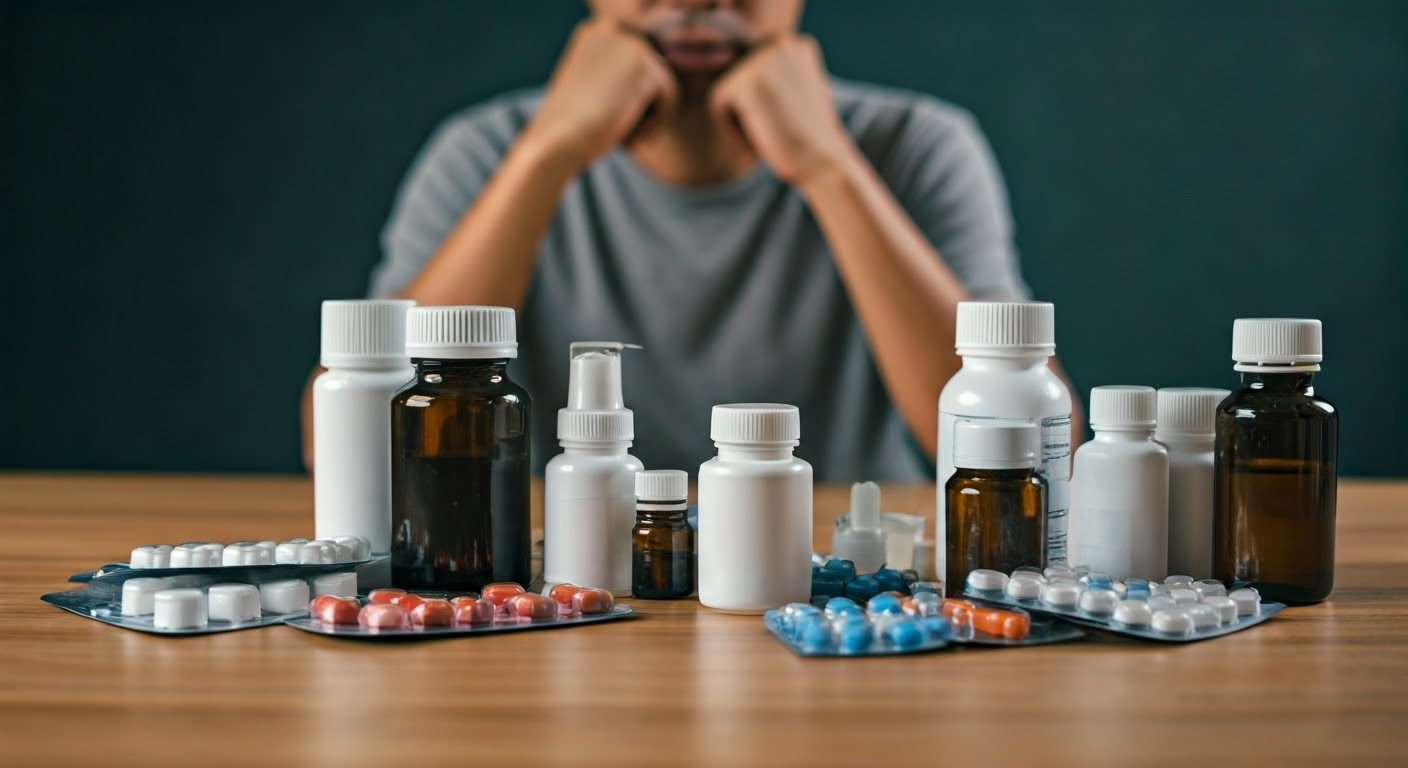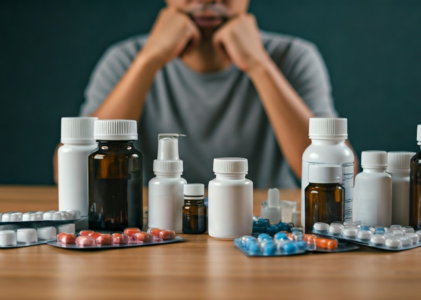Understanding Self-Medication with Drugs
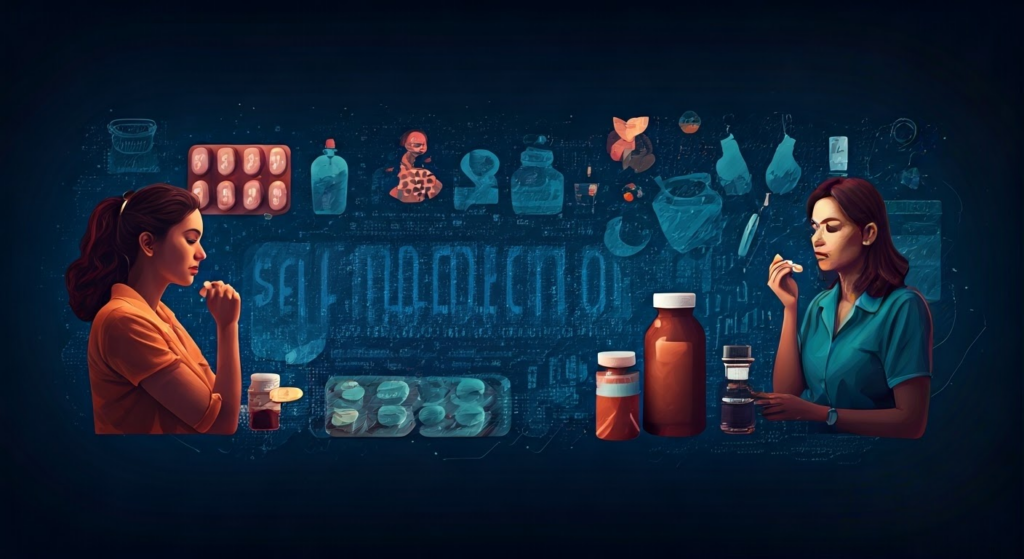
Key Highlights
- Self-medication with drugs or alcohol is the attempt to manage distress or pain caused by health conditions without professional guidance.
- It often stems from untreated mental health issues, leading individuals to misuse substances for relief.
- This behavior poses severe risks, including worsening existing mental health conditions and triggering new ones.
- Additionally, it can lead to substance abuse disorders and dangerous drug interactions.
- Recognizing the problem is crucial, followed by seeking professional help from treatment programs specializing in co-occurring disorders for holistic recovery.
Introduction
Many people who have mental health issues, such as depression or anxiety, often use substances like drugs or alcohol to cope. They might not ask for help from a professional. Instead, they try to ease their pain or worry through self-medication and alcohol use. This is called self-medication. It usually goes unseen, but it can harm both their mental and physical health.
Defining Self-Medication
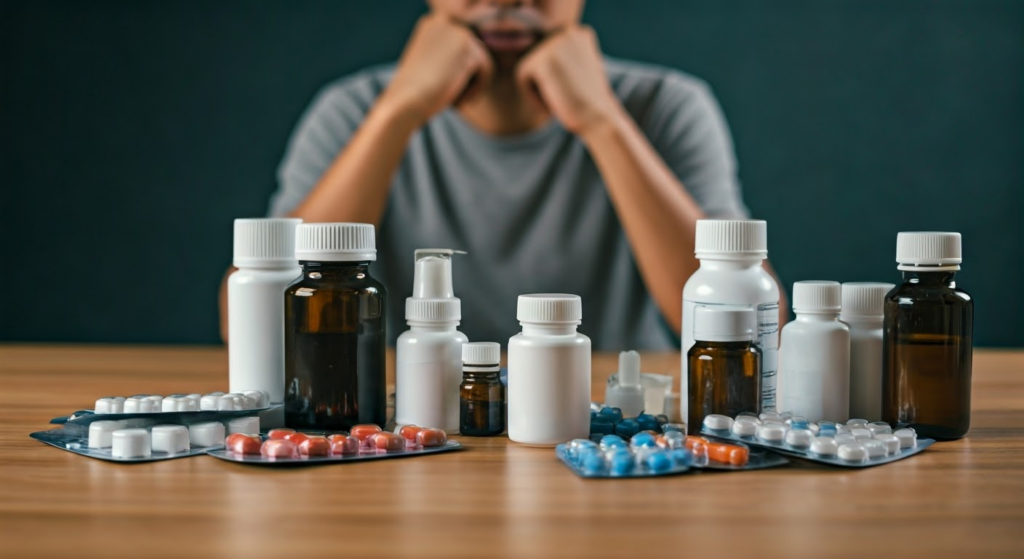
Self-medication means using substances, usually without a doctor’s advice, to relieve physical or emotional pain. It may feel like a quick way to deal with a bad headache or anxiety, but it often hides bigger problems. People might use things that are easy to get, like alcohol, marijuana, or painkillers that you can buy without a prescription.
But it can also include misusing prescription medications or getting illegal drugs. The reason people self-medicate is often the need for quick relief without facing the real issue. This avoidance can seriously affect a person’s long-term health and well-being.
What is Self-Medication?
Self-medication means using drugs or alcohol to ease symptoms or change how we feel without asking a doctor. This is worrisome when people try to handle mental health issues on their own with drug use.
People self-medicate for different reasons. Most want a quick and easy way to deal with tough feelings or body pain. Some may turn to self-medication because they cannot get healthcare, they fear being judged, or they are scared to face their health problems.
No matter the reason, we must know that self-medication can lead to serious issues. Although drugs or alcohol may provide short-term relief, they can worsen health problems, hide more serious health conditions, and increase the risk of substance abuse over the long term.
Common Drugs Used for Self-Medication
Self-medication includes many types of substances. These range from over-the-counter drugs to illegal ones. For physical issues, people often reach for over-the-counter painkillers, decongestants, or antacids to feel better.
When dealing with mental and emotional stress, many misuse prescription drugs such as sedatives, stimulants, or painkillers. While these drugs can help when taken as prescribed, they can become addictive and harmful without a doctor’s guidance.
Some recreational drugs, like marijuana, cocaine, and heroin, are also used for self-medication. People tend to use these drugs to change their mood, ease anxiety, or hide emotional pain. This is true, especially for those with mental health conditions. However, using these substances poses serious risks and can lead to addiction.
Psychological Aspects of Self-Medication
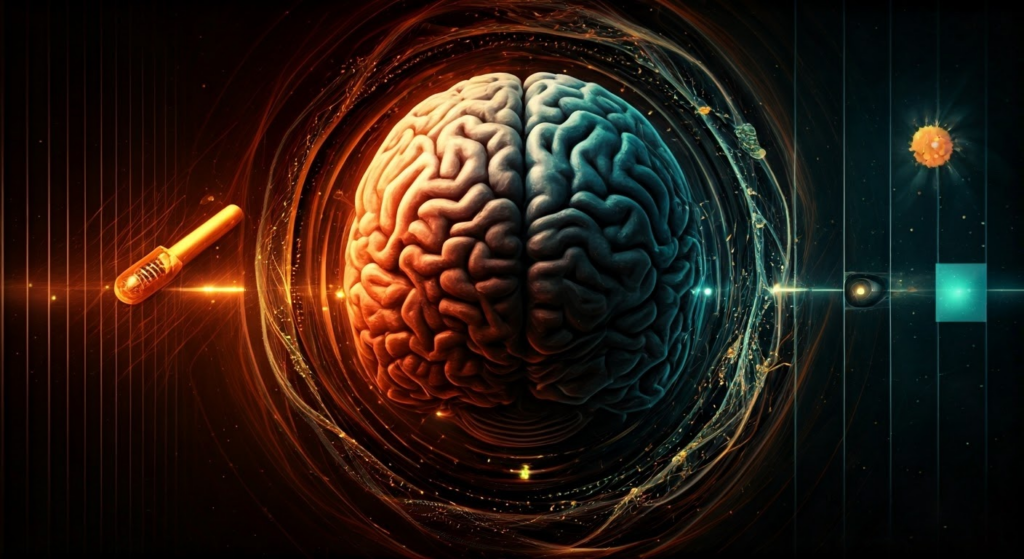
Self-medication is not just about treating physical symptoms. It often connects to a person’s mental state. Many people turn to substances to help manage their feelings, especially when they deal with mental health challenges like depression, anxiety, or trauma.
This pattern shows the tricky link between mental well-being and substance use. To tackle this behavior, it’s key to understand the mental health factors behind self-medication. This understanding can help in finding better ways to cope.
The Self-Medication Hypothesis
The self-medication idea suggests that people with mental illness may take substances to help manage their psychiatric symptoms. This idea says that the choice of drug is not random but a conscious effort to reduce specific mental pain.
For example, someone who feels anxious might drink alcohol to feel more relaxed and achieve the desired effect. Meanwhile, a person who feels depressed might use stimulants to feel better. It’s important to see that while these substances may offer temporary relief, they usually don’t fix the underlying mental health problems and might actually make them worse over time.
This idea highlights the need to look at substance use as related to mental health issues. It is important to treat mental illness with therapy, medication, and support so we can break the cycle of self-medication.
Psychological Triggers for Self-Medication
Psychological triggers are very important in self-medication. They often make people want to find comfort in substances. For example, stress from work, relationships, or personal problems is a common trigger. Drugs or alcohol seem like an escape for those dealing with stress.
People with anxiety disorders might also use substances to handle their feelings, including anxiety symptoms. This includes social anxiety, generalized anxiety, and panic disorder. The urge to calm the racing thoughts and physical feelings of anxiety can lead to self-medication.
Also, mood disorders, like depression and bipolar disorder, are often connected to substance use. The deep lows of depression or the ups and downs of bipolar disorder, along with depressive symptoms, might cause people to look for relief in substances, even if it only helps for a short time.
Physical Health and Self-Medication
Self-medication is usually talked about when we discuss mental health. However, it can also really affect our physical health. Using substances to ease physical pain may seem okay at first. But it can hide serious health problems and slow down proper treatment. This can lead to worse health, especially for people with long-term illnesses that need regular care.
In addition, using substances for a long time can hurt important organs. It can raise the chances of getting chronic diseases and make the immune system weaker. The effects of self-medication on physical health show us that we need to take care of both the problems we feel right now and the bigger issues that cause them.
Impact on Chronic Diseases
Using drugs and alcohol for a long time can be a way to cope with health problems, but it can also make chronic diseases worse. For example, if someone has diabetes, heart disease, high blood pressure, or arthritis, using these substances might put them at a higher risk for other complications.
Certain drugs can interact with prescribed medications. This can make those medications work less effectively, making health issues even worse. Additionally, substance abuse can lead to not following treatment plans properly. This can result in poor management of chronic diseases.
It is important to focus on the health conditions and help people find healthier ways to cope. This approach can reduce the negative effects of self-medication on their overall physical health.
Self-Medication in Managing Pain
Managing pain can be tough. Self-medicating with drugs or alcohol might give you some quick relief, but it also has serious long-term risks. Over-the-counter painkillers are easy to get for small pains, but they can be misused and cause problems you didn’t expect.
Prescription medications are good for serious pain, but they can lead to dependency and addiction if you don’t have a doctor’s advice. The central nervous system, which sends pain signals, can be greatly affected by using painkillers for a long time. This can result in needing more medicine over time and becoming dependent on it.
It’s very important to get help from a medical professional for pain management. This way, you can find safer options and tackle the real cause of your pain instead of just self-medicating.
Self-Medication Among Specific Groups
Self-medication habits are different for each group of people. They can vary a lot among specific professions. For example, healthcare workers or those who work in high-stress jobs may use self-medication more often. This is due to easy access to medications, busy schedules, and pressure to look a certain way.
Also, groups like college students and older adults may have their own unique trends in self-medication. This can stem from social pressures, mental health challenges, or not having easy access to healthcare. To help these groups, it’s important to conduct a review of the specific habits and create suitable support methods.
Trends in Medical Professionals
The medical field is very demanding. This, along with easy access to prescription drugs, can put medical workers at a higher risk for drug abuse. They often work long hours and face tough emotional situations with patients. There is also a pressure to seem strong, which adds to their stress.
Because they know a lot about drugs and how they work, some medical workers may think they can manage their substance use. This belief can make them wait too long to get help when they need it.
It’s important to spot the signs of drug abuse in coworkers. We should also create supportive workplaces that focus on mental health. Offering private treatment programs made for medical professionals can help them seek support without worrying about being judged or facing job issues.
Patterns Among College Students
College is a time full of change and pressure for many young people. This can lead some to handle the unique challenges they face by using substances. Things like academic stress, social pressures, and the new freedom of being away from home can lead to risky actions, like trying drugs and alcohol.
Sadly, since alcohol and the use of recreational drugs are often accepted socially on many campuses, students might see these behaviors as normal. This can stop them from looking for help.
It is very important to raise awareness about mental health at colleges. We need to encourage students to seek help when they need it. By offering easy-to-access and private mental health services that cater to college students’ needs, we can help them tackle their problems in a safe and supportive way.
Elderly and Over-the-Counter Medication
When we talk about substance abuse, some might think of illegal drugs. However, older people and young adults have special issues with over-the-counter drugs and prescription medications. They often manage many health conditions. Changes in how their body processes drugs and potential memory problems can lead to accidentally misusing medications or having harmful drug interactions.
Also, many older adults do not interact often with healthcare providers. They may feel lonely and might not want to talk about their issues. This can stop them from getting help when their drug use is a problem.
It is important to educate older adults about the risks of over-the-counter drugs. Regular communication with healthcare providers is also key, as well as creating support systems to help reduce social isolation. These steps can protect the elderly from the dangers of self-medication.
Legal and Ethical Considerations
Self-medication, especially with prescription or illegal drugs, brings up big legal and ethical issues. Getting controlled substances without permission or sharing them can lead to harsh outcomes. This shows how important it is to get medications legally and ethically.
Also, not having professional help when self-medicating raises questions. These include the right to make choices, understanding the risks, and the chance of causing harm. It’s a tricky situation where laws and ethics meet. We need to find a way that honors individual choices while keeping health and safety as the top priority.
Regulation of Drugs Commonly Used for Self-Medication
Recognizing that drug misuse can cause harm, rules about drugs used for self-medication try to balance easy access and safety. Over-the-counter medications go through strict tests and approvals to confirm they are safe when used properly. They come with clear labels and dosage guidelines to help users.
Prescription drugs are stronger and can lead to dependence, so they have more rules. These drugs are carefully controlled and need a valid prescription from a licensed healthcare provider for safe use.
Breaking these rules can lead to serious legal problems, like fines or jail time. This shows why it is important to get and use medications responsibly and legally. It is key to understand and follow these regulations to protect public health and ensure medications are used safely and ethically.
Ethical Dilemmas in Self-Medicating Behaviors
Self-medication, especially for mental health issues, raises important questions about a person’s right to make their own choices. At what point does treating a mental health condition by oneself become harmful, leading to a need for help?
Additionally, the negative view of mental health problems and substance use can stop people from looking for professional help. This raises ethical concerns about how to provide support to those who suffer in silence.
It’s important to balance respect for people’s independence with the need to protect them from harm. We need to have open discussions about mental health, reduce the shame around seeking help, and make mental health services easier and kinder to access. This way, we can tackle these ethical issues in a better way.
Risks of Self-Medication
The need for relief can lead people to self-medicate. However, it’s important to realize that this act has risks. Using substances to cover up symptoms can prevent someone from getting the right treatment for health conditions. This may make things worse over time.
Without professional help, people may mistake the dosage and experience harmful side effects, which can even be dangerous. It’s vital to understand these risks so that one can make smart choices about their health and seek good medical or mental health care.
Potential for Addiction
One big risk of self-medication is addiction. Using substances too often, even if it starts to help with a symptom, can cause dependence. The brain can change to expect the substance. This can lead to cravings and withdrawal symptoms when trying to stop.
Drug dependence is a long-term and recurring issue. It can seriously impact a person’s life. It affects their physical health, mental health, relationships, and overall happiness.
It’s important to understand how addictive substances can be when people self-medicate. This helps in spotting the early signs of dependence and getting help when needed. Professional help is available to assist people in recovering. They will learn better ways to deal with the problems that lead them to use substances.
Dangers of Misdiagnosis
Self-diagnosing and treating health problems alone can cause serious issues. There is a high chance of getting the diagnosis wrong. Symptoms can be tricky. What seems like a small problem could actually be a sign of a bigger medical or mental health issue that needs special treatment.
This is very important when it comes to mental health. Symptoms from different conditions can look the same. For example, if you try to self-medicate for anxiety, you might miss underlying depression or another mental health issue. This can lead to the wrong treatment and possibly make things worse.
Getting a professional evaluation is key. It helps you get the right diagnosis and ensures treatment plans focus on the real cause, not just the symptoms you see. It’s important to trust healthcare experts to handle the details of diagnosis and treatment well.
Interactions and Side Effects
Medications, whether they are bought over-the-counter or given by a doctor, can affect each other and existing health conditions. This can lead to serious problems. These interactions can change how well medications work, increase side effects, or cause bad reactions.
Using medications on your own, without fully understanding these risks, is very dangerous. This is especially true if you have multiple health conditions or are using various substances at the same time.
It is very important to talk to healthcare professionals, like doctors and pharmacists. They can give you personalized advice about possible interactions, make changes to your dosages if needed, and watch for any bad effects. This helps ensure safe and effective medication use.
Alternatives to Self Medication drugs abuse
The charm of quick fixes can be tempting. However, it’s important to find other ways to deal with health problems. Rather than using substances to hide symptoms, it’s better to look for healthy solutions that support long-term wellness.
Options like professional treatment, changes in lifestyle, and natural remedies offer a complete way to heal. This helps people take charge of their health and tackle the main causes of their issues. It’s always wise to seek professional help to find the best way to move forward.
Professional Treatment Options
Professional treatment gives a clear and detailed way to deal with the health problems that lead to self-medication. For body issues, talking to doctors, specialists, and physical therapists can help create a plan to reduce symptoms and help healing.
Mental health services like therapy, counseling, and medicine support are very important for addressing issues such as depression, anxiety, and trauma. These services help people develop coping skills, better thinking patterns, and ways to manage their health conditions well.
Understanding that you need help is a sign of strength. It is an important step on the path to recovery. Professional treatment offers proven methods, continuous support, and a safe space to look at the real reasons behind self-medication.
Lifestyle Changes and Natural Remedies
Making positive lifestyle changes can really help improve your physical and mental well-being by increasing social support. It offers better choices than self-medication. Keeping active by adding regular exercise to your daily routine can lower stress, ease anxiety, and lift your mood.
Eating a balanced diet full of nutrient-rich foods gives your body the vitamins and minerals it needs to work well. Also, getting good sleep is important. Setting a regular sleep schedule and having a calming bedtime routine can lead to better sleep, which affects your mood, energy, and how your brain works.
You can also try natural remedies, like herbal supplements or aromatherapy. Relaxation techniques, like meditation or yoga, can also help with stress, anxiety, and some discomfort. Just be sure to talk to a healthcare professional before using these remedies.
Importance of Seeking Help
Recognizing that you need help shows strength. It means you care about your health and well-being. Remember, asking for help is not a weakness; it is a brave step toward getting better.
If you struggle with mental health problems, it’s important to reach out. Find a therapist, a counselor, or any mental health professional. They create a safe space for you to talk about your issues. They can help you build coping skills and provide the right treatment.
Help is not just about therapy. It includes support groups, family counseling, and community services. These resources give you a feeling of connection and understanding. Remember, you are not alone in this journey. Seeking help is the first step toward healing and leading a healthier, happier life.
Conclusion
Self-medicating with drugs can harm both your physical and mental health. It’s important to know the risks of getting the wrong diagnosis, becoming addicted, or having bad reactions from using drugs on your own. Instead of self-medicating, try to explore professional treatment options for drug addiction, make healthy lifestyle changes, and consider natural remedies. Always put your well-being first and ask for help if you need it. If you or someone you know is facing substance abuse issues due to self-medication, please seek support and resources for addiction treatment. Your health matters, and getting professional advice is key to finding a healthier and safer way forward.
Frequently Asked Questions
What legal consequences can self-medication entail?
Self-medication, especially with prescription drugs obtained illegally, can cause legal trouble. Depending on the drug and local laws, people may face fines, probation, or even jail time. This shows how important it is to get medications legally.
How does self-medication impact mental health?
Self-medication can hide the signs of mental health problems. This can slow down the right treatment and make things worse. Also, using substances for a long time as a coping mechanism can worsen current psychiatric disorders. It might even lead to new ones developing.
Are there safe ways to self-medicate?
It is usually not safe to treat yourself for any health issue. This is especially true when using prescription medications or doing it without help from a professional. It is important to talk to healthcare experts for the right diagnosis and treatment. They can also help you find safer options.
What signs indicate that self-medication has become harmful?
Warning signs of dangerous self-medication include using more substances than before, having withdrawal symptoms when not using, ignoring responsibilities, facing bad results, and feeling like you can’t stop even if your health or relationships are suffering.
Can self-medication lead to substance abuse disorders?
Self-medication can cause substance abuse disorders. When people often use drugs or alcohol to deal with mental health issues or other health problems, including mental health disorders, they run a higher risk of becoming dependent or addicted. This behavior can lead to the development of a substance use disorder.
Where to find support and resources for addiction treatment in the U.S.?
In the United States, the Substance Abuse and Mental Health Services Administration (SAMHSA) provides a national helpline at 1-800-662-HELP. They also offer online resources to help people find local treatment centers, support groups, and mental health services.
https://doi.org/10.1017/S0033291713001438
https://doi.org/10.1037/adb0000129
https://doi.org/10.1177/20420986221127501
https://api.semanticscholar.org/CorpusID:151159278
https://search.worldcat.org/issn/0158-1570
https://search.worldcat.org/issn/2161-3303
